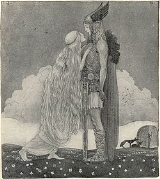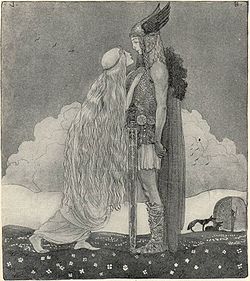
Svipdag
Encyclopedia

Old Norse
Old Norse is a North Germanic language that was spoken by inhabitants of Scandinavia and inhabitants of their overseas settlements during the Viking Age, until about 1300....
Eddaic poems
Poetic Edda
The Poetic Edda is a collection of Old Norse poems primarily preserved in the Icelandic mediaeval manuscript Codex Regius. Along with Snorri Sturluson's Prose Edda, the Poetic Edda is the most important extant source on Norse mythology and Germanic heroic legends, and from the early 19th century...
Grógaldr
Grógaldr
Grógaldr or The Spell of Gróa is the first of two poems, now commonly published under the title Svipdagsmál found in several 17th century paper manuscripts with Fjölsvinnsmál. In at least three of these manuscripts, the poems are in reverse order and separated by a third eddic poem titled, Hyndluljóð...
and Fjölsvinnsmál
Fjölsvinnsmál
Fjölsvinnsmál or The Sayings of Fjölsvinnr is the second of two Old Norse poems commonly published under the title Svipdagsmál "The Lay of Svipdagr". These poems are found together in several 17th century paper manuscripts with Fjölsvinnsmál...
, which are contained within the body of one work; Svipdagsmál
Svipdagsmál
Svipdagsmál or The Lay of Svipdagr is an Old Norse poem, a part of the Poetic Edda, comprising two poems, The Spell of Gróa and The Lay of Fjölsviðr. The two works are grouped since they have a common narrator, Svipdagr. Moreover they would appear to have a common origin since they are closely...
. Svipdagr is set a task by his stepmother, to meet the goddess Menglöð, who is his "fated bride." In order to accomplish this seemingly impossible task, he summons by necromancy
Necromancy
Necromancy is a claimed form of magic that involves communication with the deceased, either by summoning their spirit in the form of an apparition or raising them bodily, for the purpose of divination, imparting the ability to foretell future events or discover hidden knowledge...
the shade of his dead mother, Gróa
Gróa
In Norse mythology, Gróa is a völva and practitioner of seiðr, the wife of Aurvandil the Bold.-Prose Edda:Gróa appears in the Prose Edda book Skáldskaparmál, in the context of Thor's battle with the jötunn Hrungnir...
, a völva
Völva
A vǫlva or völva is a shamanic seeress in Norse paganism, and a recurring motif in Norse mythology....
who also appears in the Prose Edda
Prose Edda
The Prose Edda, also known as the Younger Edda, Snorri's Edda or simply Edda, is an Icelandic collection of four sections interspersed with excerpts from earlier skaldic and Eddic poetry containing tales from Nordic mythology...
, to cast nine spells for him. This she does and the first poem abruptly ends.
At the beginning of the second poem, Svipdagr arrives at Menglöð's castle, where he is interrogated in a game of riddles by the watchman, from whom he conceals his true name. The watchman is named Fjölsviðr, a name of Odin
Odin
Odin is a major god in Norse mythology and the ruler of Asgard. Homologous with the Anglo-Saxon "Wōden" and the Old High German "Wotan", the name is descended from Proto-Germanic "*Wodanaz" or "*Wōđanaz"....
in Grímnismál
Grímnismál
Grímnismál is one of the mythological poems of the Poetic Edda. It is preserved in the Codex Regius manuscript and the AM 748 I 4to fragment. It is spoken through the voice of Grímnir, one of the many guises of the god Odin, who is tortured by King Geirröth...
47. He is accompanied by his wolf-hounds Geri and Gifr. After a series of eighteen questions and answers concerning the castle, its inhabitants, and its environment, Svipdagr ultimately learns that the gates will only open to one person: Svipdagr. On his revealing his identity, the gates of the castle open and Menglöð rises to greet her expected lover, welcoming him "back" to her.
A champion by the same name, perhaps the same character, appears in the Prologue to the Prose Edda, in Heimskringla
Heimskringla
Heimskringla is the best known of the Old Norse kings' sagas. It was written in Old Norse in Iceland by the poet and historian Snorri Sturluson ca. 1230...
and in Gesta Danorum
Gesta Danorum
Gesta Danorum is a patriotic work of Danish history, by the 12th century author Saxo Grammaticus . It is the most ambitious literary undertaking of medieval Denmark and is an essential source for the nation's early history...
.
Since the 19th century, following Jacob Grimm
Jacob Grimm
Jacob Ludwig Carl Grimm was a German philologist, jurist and mythologist. He is best known as the discoverer of Grimm's Law, the author of the monumental Deutsches Wörterbuch, the author of Deutsche Mythologie and, more popularly, as one of the Brothers Grimm, as the editor of Grimm's Fairy...
, Menglöð has been identified with Freyja in most scholarship. In his children's book Our Fathers' Godsaga, the Swedish scholar Viktor Rydberg
Viktor Rydberg
Abraham Viktor Rydberg was a Swedish writer and a member of the Swedish Academy, 1877-1895...
identifies Svipdagr with Freyja's husband Óðr/Óttar. His reasons for doing so are outlined in the first volume of his Undersökningar i germanisk mythologi (1882). Other scholars who have commented on these poems in detail include Hjalmar Falk (1893), B. Sijmons and Hugo Gering (1903), Olive Bray (1908), Henry Bellows (1923), Otto Höffler (1952), Lee M. Hollander (1962), Lotte Motz
Lotte Motz
Lotte Motz, born Lotte Edlis, was an Austrian-American scholar who published four books and many scholarly papers, primarily in the fields of Germanic mythology and folklore.-Life:-...
(1975), Einar Ólafur Sveinsson (1975), Carolyne Larrington (1999), and John McKinnell (2005).
There is also a Swæbdæg in the Anglo-Saxon Chronicle
Anglo-Saxon Chronicle
The Anglo-Saxon Chronicle is a collection of annals in Old English chronicling the history of the Anglo-Saxons. The original manuscript of the Chronicle was created late in the 9th century, probably in Wessex, during the reign of Alfred the Great...
among the forefathers of Aella
Aella of Deira
Ælla , is the first certain king of Deira. One of his sons was Edwin of Northumbria and his daughter Acha married Æthelfrith of Bernicia....
, King of Deira
Deira
Deira was a kingdom in Northern England during the 6th century AD. Itextended from the Humber to the Tees, and from the sea to the western edge of the Vale of York...
.

